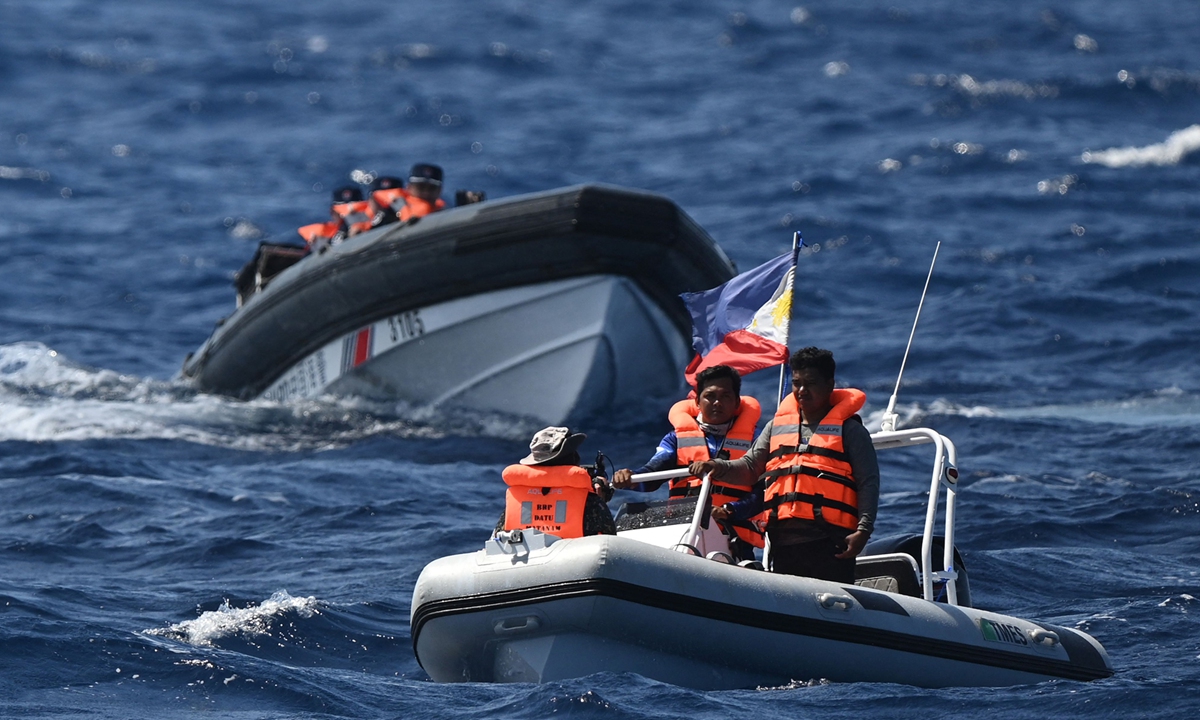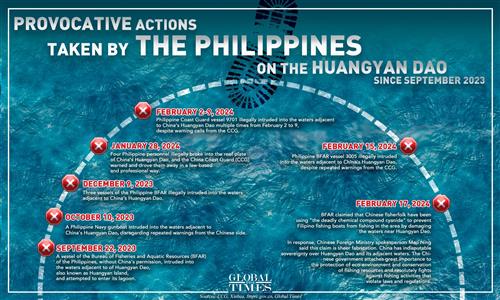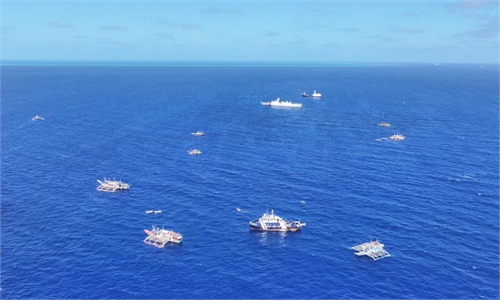Marcos adopts tough China stance in Canberra, 'to drag ally into provocative strategy'
Australia should act prudently so ties with China don't take another nosedive: experts

China Coast Guard expels Philippine vessel for illegal intrusion into South China Sea waters after repeated warnings on February 15, 2024. Photo: Visual News
Philippine President Ferdinand Romualdez Marcos Jr. adopted a tough stance over the South China Sea disputes against China and sought greater security cooperation with allies during his visit to Australia on Thursday, a move that Chinese experts regarded as aiming to drag Australia into the Philippines' provocative and confrontational strategy.
Despite a high-profile reception and an agreement to boost collaboration on maritime security signed by the two sides, analysts warned that Australia should adopt a prudent attitude over questions concerning China's territorial sovereignty and integrity if Canberra does not want to become an anti-China tool of Manila and see the hard-won recovery of China-Australia relations fall to a low point once again.
In his address to the Australian parliament on Thursday, the first by a Philippine leader, Marcos said he will "not allow any attempt by any foreign power to take even one square inch of our sovereign territory," alluding to the heating South China Sea dispute with China.
According to the Australian government, the two leaders announced new Memoranda of Understanding, including enhanced maritime cooperation to strengthen existing civil and defense maritime commitments.
Experts believe that the Philippines and Australia's pursuit of strengthening military cooperation may have negative consequences for regional security and stability: the regional arms race may intensify and the existing economic integration process in the Asia Pacific will be impacted.
In response, Chinese Foreign Ministry spokesperson Mao Ning said at a press briefing on Thursday that the current situation in the South China Sea remains generally stable, and relevant countries "should not harm the interests of other countries or undermine regional peace and stability" when conducting maritime security cooperation.
Li Haidong, a professor at the China Foreign Affairs University, told the Global Times on Thursday that Marcos' trip is mainly about lobbying for more support for the Philippines to take more aggressive and risky actions on South China Sea disputes.
The Philippines hopes to drag Australia into its confrontational and provocative strategy against China, said Chen Hong, director of the Australian Studies Center at East China Normal University, echoing Li.
Marcos has turned the Australian parliament into a platform to stir up regional tensions and to incite Australian people and politicians against China, and that looks malicious, said Chen.
Marcos' trip came after Albanese became the first sitting Australian prime minister in two decades to visit the Philippines in September 2023. During the trip, the two leaders signed a strategic partnership agreement that elevates their relationship. The Philippines and Australia also ran their first joint sea and air patrols in the South China Sea in November 2023, showing the two sides' relationship getting warmer.
Marcos also stressed on Thursday that Australia and the US are the only countries with whom the Philippines has a "visiting forces agreement," according to media reports. He said the Philippines was on the "frontline" against actions that "undermine regional peace, erode regional stability."
Marcos' Australia trip, on the other hand, is actually cooperating with the US to promote Washington's creation of a "small NATO" in the Asia Pacific, Li said.
According to Chen, Australia is always under pressure from the US. In addition, Australia's opposition leader Peter Dutton has been criticizing the Albanese government for being "soft" on China as Australia prepares to usher in the next federal parliamentary election in 2025. In this case, the Australian government tried to use the Philippines to hype up China-related topics and attempted to show a tougher attitude toward China.
"However, the current strategy adopted by the Albanese government is seemingly more of a response to the US strategy on the surface, such as giving Marcos a high-level reception and signing agreements, but the Albanese government will take a cautious attitude in substance and specific actions," said Chen.
Relations between China and Australia had deteriorated under the government of previous prime minister Scott Morrision. Since Albanese took office, bilateral relations have improved and achieved basic stability, a situation that was hard-won.
Australians are well aware that no good will come of Australia becoming a tool of the Philippines to confront China, Chen said.
According to data from the Australian government, China is Australia's largest two-way trading partner, accounting for 26 percent of Canberra's goods and services trade with the world in FY2022-23. Two-way trade with China increased 12 percent in FY2022-23, totaling $316.9 billion.
Citing sources, the South China Morning Post said on Thursday that Australia has invited Chinese Foreign Minister Wang Yi for a two-day visit in the second half of March.
China is resolute in defending its territorial sovereignty, said Chen, noting that if Australia chooses confrontation against China with the Philippines, Beijing-Canberra ties, which have managed to recover, will hit a low point again, with future disputes being more difficult to properly resolve.




